
OSESG-GL Newsletter, Jan - March 2021, Issue 3.
|

|
Huang Xia, Special Envoy of the Secretary-General
for the Great Lakes region
|
|
In this edition…
|
To our esteemed readers:
Happy New Year and thank you for devoting some of your time to read this edition of our newsletter! As in the rest of the world, the Coronavirus pandemic has tested the resilience of Africa’s Great Lakes region since early 2020. Throughout these challenging times, we have spared no efforts to work with the countries of the Great Lakes and regional organizations to maintain progress towards sustainable peace and development. This newsletter offers several examples of this collective endeavor over the past year.
Never in recent memory has humanity faced a challenge of this magnitude for its own survival. This existential threat has spared no communities, no countries, no regions, and no continents. As of today, the number of deaths to the virus globally has reached and passed the two million mark. This is a global tragedy of which the consequences will be with us for a long time to come. We are grateful that the Great Lakes region of Africa has been spared from the pandemic’s more devastating health effects thus far, and at the same time, we are aware of the necessity to remain vigilant and continue observing the health protocols in place. Meanwhile, we mourn with the rest of the world the many lives of loved ones taken from us prematurely. World economies have been brought to a halt resulting in millions of job losses. In many countries, health services proved inadequate or insufficient in the face of the scale of the disease. Schools, universities, and other academic centers were forced to close. In short, there are hardly any sectors or areas that have not been touched by the Coronavirus. Read more
|
|
|
|
SIX QUESTIONS ABOUT THE NEW UN STRATEGY FOR THE GREAT LAKES
On 22 October 2020, Secretary-General António Guterres approved the United Nations (UN) Strategy for Peace Consolidation, Conflict Prevention and Conflict Resolution in the Great Lakes region. The Strategy, developed by the Office of the Special Envoy for the Great Lakes region in consultation with a wide range of stakeholders, including representatives from the countries in the region, proposes an integrated, forward-leaning approach that aims to better leverage the political, operational, and programmatic expertise of the UN in support of a peaceful, inclusive, prosperous, and resilient region. While prioritizing political solutions, the Strategy advocates for a shift in narrative beyond the traditional focus on conflict-related challenges that emphasizes opportunities for peace, security, and people-centered development. It puts forth ten priorities, structured around three pillars, which are to guide UN engagement in the region, in line with the 2030 Agenda for Sustainable Development, while also informing specific and immediate priority actions in the next three years. Read more
|
|
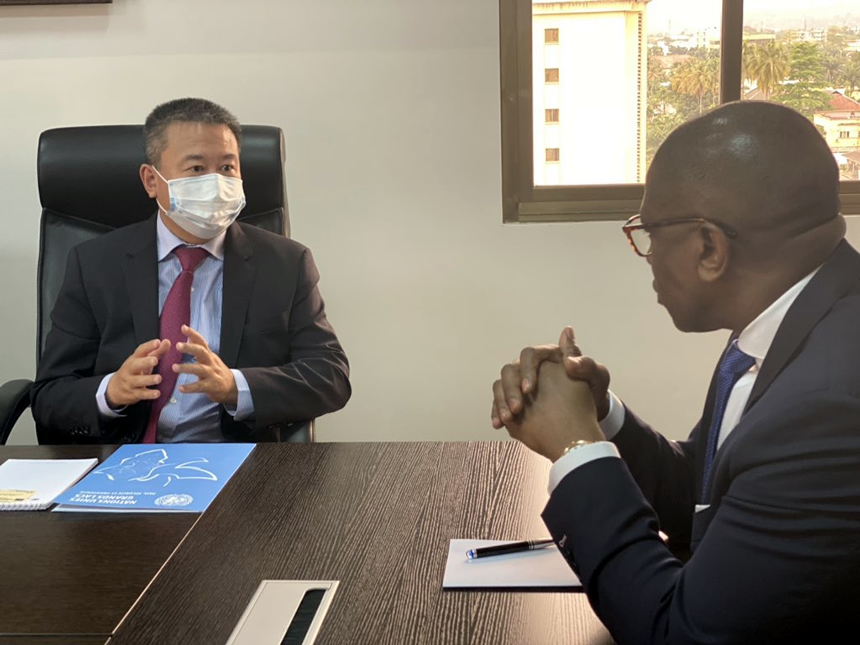
Special Envoy Huang Xia (L) with Guillaume Manjolo, DR Congo’s Minister of International Cooperation, Regional Integration and the Francophony, Kinshasa, DRC, 1 October 2020.
|
THE QUEST FOR PEACE, STABILITY AND DEVELOPMENT IN THE GREAT LAKES REGION CONTINUES DESPITE THE COVID-19 PANDEMIC
The momentum in the Great Lakes region towards positive and sustainable change continued in 2020, despite the impact of the COVID-19 pandemic and, related thereto, a temporary slowdown of some regional initiatives. Efforts by countries in the region to rebuild trust and resolve tensions through diplomatic means testified to their sustained commitment to advance bilateral and regional cooperation in pursuit of peace, stability, and development.
In support of these positive dynamics, the United Nations Special Envoy for the Great Lakes engaged national authorities and regional partners through virtual consultations and shuttle diplomacy efforts. Following the easing of travel restrictions in September, he visited Angola, Burundi, the Republic of Congo, the DRC, Rwanda, and Uganda with a view to facilitating dialogue, building confidence, strengthening partnerships, and encouraging regional solidarity in the face of COVID-19. He also consulted his interlocutors on the Regional Strategy, which, inter alia, reaffirmed the importance of building trust and promoting inclusive political processes in efforts to advance peace, stability, and development. Read more
|
|
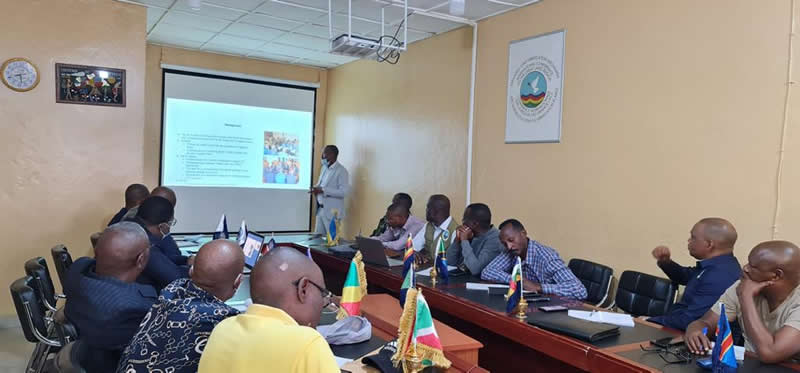
Meeting of members of the Extended Joint Verification Mechanism (EJVM),
Goma, eastern DRC, 12 January 2021
|
TOWARDS A COMPREHENSIVE APPROACH TO ARMED GROUPS IN THE GREAT LAKES REGION.
Supporting the Great Lakes region in addressing the threats posed by armed groups is a key priority for the Special Envoy and his Office. While the overall security situation in the region remained relatively stable in 2020, the activities of armed groups, both foreign and local, particularly in the eastern Democratic Republic of the Congo (DRC), continued to fuel human suffering and movements of population as well as to hamper sustainable development and strain relations among neighbouring countries, thus having an overall negative impact on regional stability. Armed groups also continued to contribute to and benefit from an illegal conflict economy centered on the region’s abundant natural resources, with adverse effects on development, governance, human rights, and security. Read more
|
|

Special Envoy Huang Xia (L) and Sidi Ould Tah, Director General of
Arab Bank for Economic Development in Africa (BADEA).
|
ATTRACTING PRIVATE INVESTMENT TO ENABLE ECONOMIC RECOVERY AND SDG PROGRESS IN THE GREAT LAKES REGION IN THE POST-COVID-19 ERA
Until early 2020, many Great Lakes countries were among the fastest growing economies in the world. However, the COVID-19 pandemic has brought a different dynamic in the region. With an estimated GDP growth of 3.5% in the pre-COVID-19 era, recent projections indicate that the 12 countries of the International Conference on the Great Lakes Region (ICGLR) will experience an economic slump of -2% in 2020. The COVID-19 pandemic has impacted the Great Lakes countries in different ways, but the common denominator remains the severity of the crisis and its deep and prolonged social and economic effects. Indeed, the courageous measures taken, at the national and regional levels, to contain the outbreak in the region have limited somehow the spread of the pandemic, though at a high socio-economic cost, thereby significantly eroding progress towards the Sustainable Development Goals. The number of people living in extreme poverty is expected to increase. Rising prices of commodities, unemployment, falling exports and debt deterioration have further increased pressures on already-fragile economies. Read more
|
|

Meeting of business people at a roadshow for the Great Lakes Investment
and Trade Conference (GLITC), Beijing, China, 2 April 2019
|
ADDRESSING THE ILLICIT EXPLOITATION OF NATURAL RESOURCES IN THE GREAT LAKES REGION
The Office of the Special Envoy for the Great Lakes region has been supporting regional efforts to address this issue by promoting a more sustainable management of natural resources. To advance this critical issue, Special Envoy Huang Xia has developed a vision based on a holistic approach with all stakeholders across the entire value chain, to overcome the decade-long illicit trade of natural resources from the region. This vision also highlights the UN’s support to the Regional Initiative against the Illegal Exploitation of Natural Resources in the Great Lakes Region (RINR) which aims to provide a concerted response to this scourge through a comprehensive approach including an elaborate Regional Certification Mechanism (RCM). Read more
|
|
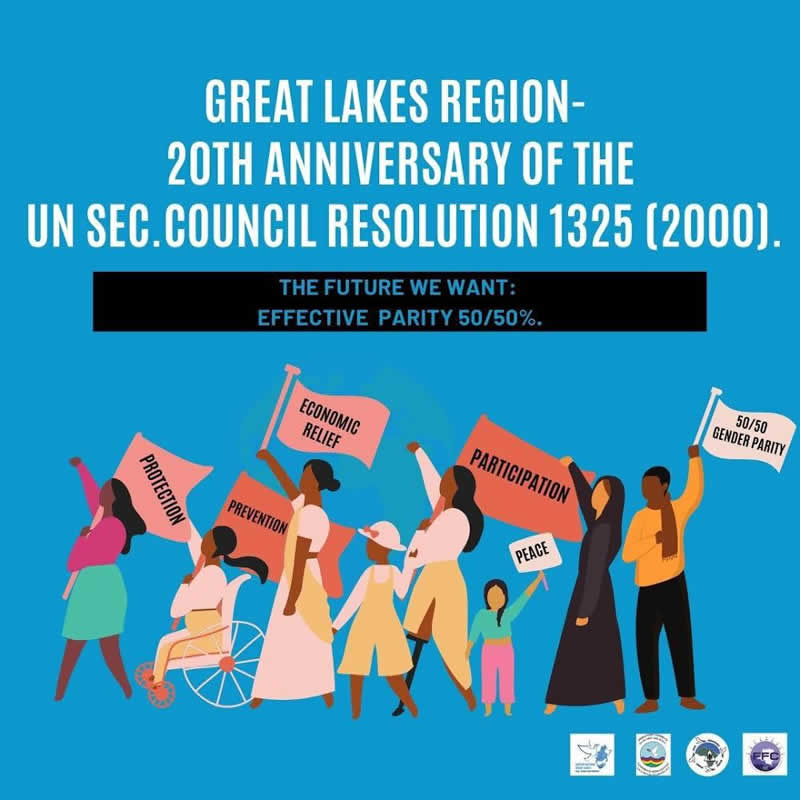 |
FOCUS ON WOMEN’S CRITICAL ROLE IN CONFLICT RESOLUTION AND PEACEBUILDING
Women have a role to play in conflict resolution and peacebuilding. To this end the Office of the UN Special Envoy for the Great Lakes region’s new strategy recognises the Women, Peace and Security (WPS) agenda as indispensable in promoting gender equality and women’s contribution to peacebuilding efforts.
Based on this premise, the Office of the Special Envoy is pursuing cooperation with women’s civil society organisations, raising their profiles, and providing them with a platform for their voices to be heard, particularly on critical issues pertaining to women and human rights.
The Office headed by UN Special Envoy Huang Xia, along with the International Conference on the Great Lakes Region (ICGLR), has been promoting the integration of the gender dimension in responding to the COVID-19 pandemic through the establishment of a civil society organization coordination group. Read more
|
|
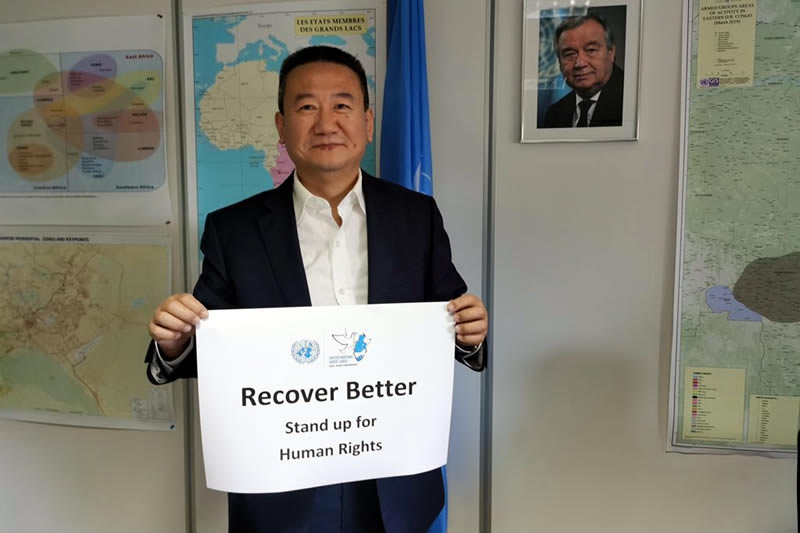
UN Special Envoy for the Great Lakes Region, Huang Xia, commemorating
International Human Rights Day, 10 December 2020
|
THE IMPERATIVES TO PEACE, SECURITY AND SUSTAINABLE DEVELOPMENT IN THE GREAT LAKES
OSESG-GL supports the implementation of regional commitments on the fight against impunity, the strengthening of the rule of law and the promotion and protection of human rights as key contributors to peace, security and sustainable development in the Great Lakes region. In 2020 the Great Lakes region continued to register a high number of human rights violations committed by armed groups, state actors and other non-armed actors. Extra-judicial killings, enforced disappearances, violations to physical integrity including sexual and gender-based violence are amongst the violations registered. Perpetrators of serious crimes continue to benefit from impunity, including through taking advantage of porous borders to seek shelter from prosecution in neighboring states - a factor that contributes to accrued mistrust and tension. Some positive developments in efforts to address the human rights situation and impunity in the Great Lakes region have been noted over the course of the last months, including with the sentencing of several perpetrators of serious crimes. Read more
|
|
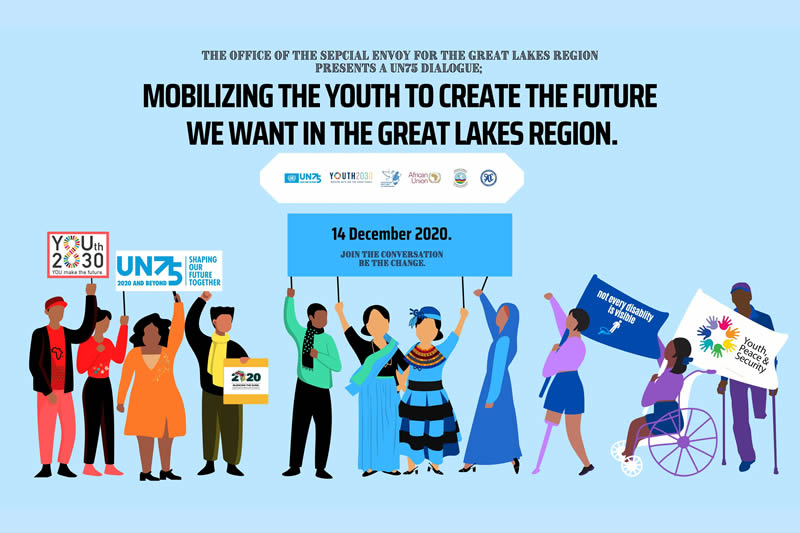 |
THE MEANINGFUL PARTICIPATION OF YOUTH IS CRUCIAL FOR THE REGION’S STABILITY
In the Great Lakes Region, 75% of an estimated population of 420 million people are bellow 35 years old. Youth in the region is, however, still largely underrepresented in decision making and is disproportionately affected by the negative impacts of conflicts, such as unemployment. The predicament of unemployed youths has been further exacerbated in 2020, due to the various repercussions of the COVID-19 pandemic. Another challenge facing the youths is the lack of job opportunities in the region, which makes them easy prey for recruitment in non-state armed groups operating in the region. Other important issues facing the youth today range from lack of education, high percentage of youth refugees and internally displaced persons, to drug and substance abuse. These factors undermine regional development, threaten security, and have an impact on durable peace and reconciliation in the region. Read more
|
|
The PSC Framework in a few words...
In February 2013, 11 nations signed the Peace, Security and Cooperation (PSC) Framework for the Democratic Republic of the Congo (DRC) and the region, in a renewed drive to end the recurring cycles of devastating conflicts in eastern DRC which impact stability and development in the Great Lakes area of Africa. On 31 January 2014, two more countries, Kenya and Sudan, became signatories of the PSC Framework. The Framework aims to help "address the root causes of conflict and put an end to recurring cycles of violence" in eastern DRC and the Great Lakes Region...Read more
|
|
| You are receiving this email because of your relationship with the Office of the Special Envoy of the Secretary-General for the Great Lakes region. If you do not wish to receive this newsletter, you can unsubscribe here.
|
|
|
|
 Office of the Special Envoy for the Great Lakes
Office of the Special Envoy for the Great Lakes
 Office of the Special Envoy for the Great Lakes
Office of the Special Envoy for the Great Lakes